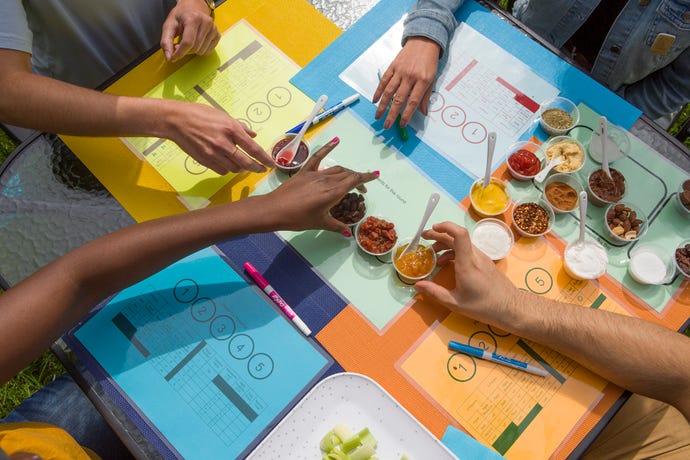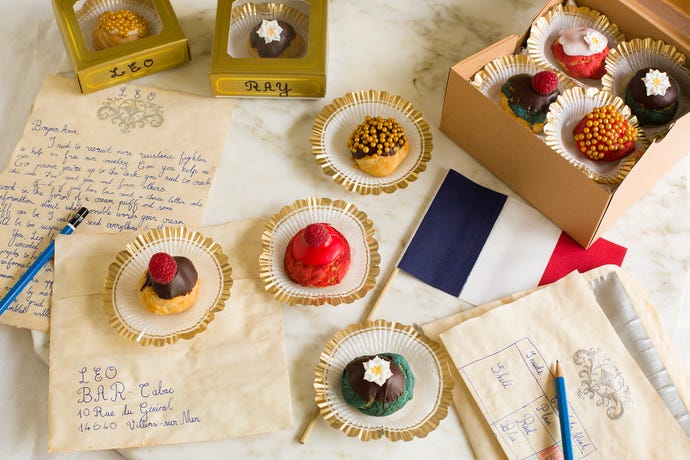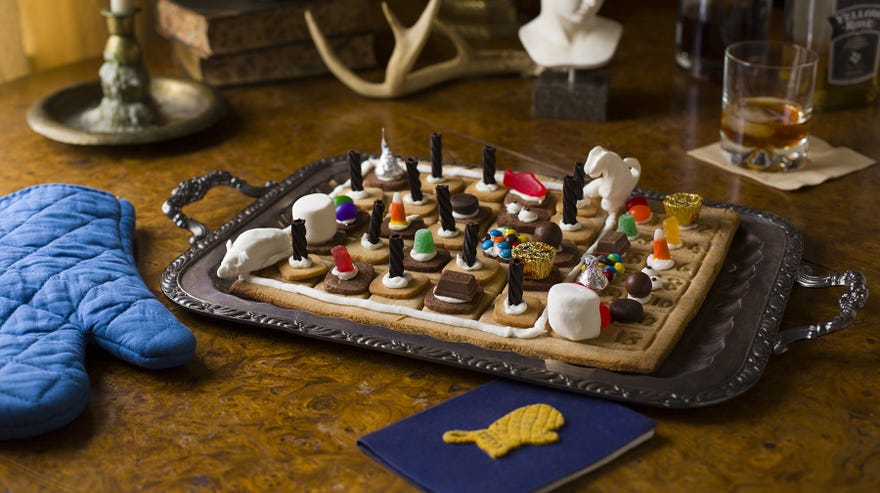How Rockstar banning Cake Day helped launch a designer's career in edible games
Former L.A. Noire developer Jenn Sandercock on the overlap between feast and play
Years before she worked on top-drawer point-and-clickers Return To Monkey Island and Thimbleweed Park, Australian game developer Jenn Sandercock was a junior designer on Team Bondi's historical open world game L.A. Noire. Eventually published by Grand Theft Auto developers Rockstar in 2011, L.A. Noire took seven years to make and is an especially notorious example of crunch culture and mismanagement. Sandercock joined in the middle of one such crunch period, and wanted to make life a little easier for her exhausted colleagues. "Everyone looked so miserable after literally years of hard work & crunch," she wrote on Twitter in 2018. "So late one night after work I baked 2 cakes for the office. I sent out a mass email & we all took 30 minutes to eat cake and talk." Sandercock began hosting weekly "Cake Days", baking a fresh batch in her own time to share around the office.
Rockstar were unimpressed, however. They thought Cake Day was evidence of poor productivity and, according to Sandercock, badgered Team Bondi leadership into forcing her to only share cake during official lunch hours. "Apparently the higher ups thought our entire office slacked off ALL the time because we had cake once a week," Sandercock wrote. She herself was told "that I was jeopardising my career". Sandercock hasn't let the demise of Cake Day cramp her creative interest in food, however. In fact, she's found a way to combine baking with game design. Sandercock is now the author of Edible Games, a book of recipes and instructions for concocting games out of food, and food out of games.

The games in question cover a large and colourful range. Some are about rejoicing in the physical properties of certain foods, like the self-explanatory Flip 'n' Stick or J-Wobbler, which is sort of pinball with pieces of jelly. Others are brainier - there's hidden role game High Tea Assassin, in which the roles correspond to the flavoured innards of interchangeable-looking baked treats, and The Order Of The Oven Mitt, a waistline-expanding take on chess.
The Edible Games cookbook didn't begin with Sandercock's time at Team Bondi, though the experience certainly shaped Sandercock's thinking. The idea of games you can eat was one of several early-career experiments. "I ended up doing a project where every week for a year, I came up with a new game idea," Sandercock says. "And one of them was like a baking game where you were going around a Monopoly board, competing for ingredients, and then you make something, and it'd be random, depending on what you did during the course of the game. And then a couple of years later, I did another project where I was implementing a different gameplay mechanic every month for another year. And in that, I thought I really like this idea. I'm gonna try this out."
Sandercock's first edible game was Dinner: The Boardgame, latterly reinvented as Roll For Flavour, in which players move around a board's worth of cooking instructions, throwing together a full meal square by square. After showing her creation off at a gamejam (actual jam may have been involved), Sandercock felt that she had stumbled on a "new medium".
Sharing food is among the most basic forms of community. Fighting over it is among the most basic forms of competition. In her edible games, Sandercock emphasises community, which extends to being mindful of different dietary needs, preferences and taboos. "I like games that are about friendship and curiosity," she says. "So I was very clear about not making games that would make people eat more than they really wanted to, or be mean to people - like, trick them into eating something way spicy, or something they were allergic to. There were some basic rules, like you will not share saliva - it's a core principle of my games that you don't share saliva with people."
That said, there is a definite element of competition to some games, albeit transfigured by the element of taste. Take The Order Of The Oven Mitt. "Each of the pieces has a different candy on top, and none of them have points values, but when people play they get really competitive about 'I really want the Jelly Bean', or 'I absolutely do not want to eat the Jelly Bean'. It's interesting seeing people play it because it's a two player game or two teams, and I tell people that you can play cooperatively, or you can play competitively. And it's interesting to see how the cooperative people will be like, 'yeah, sure, I'll give you this, if you give me that candy'. And the competitive people are like, 'I'll do everything so that you can't get that, and I'll like, move stuff around, I'll make the game take forever.'"

Whether people treat edible gaming as a competitive exercise or not, Sandercock says there's more tolerance of mess and ambiguity here than you'd find among many players of videogames. "In many ways the requirements for an edible game being fun are much lower than most other games," she muses. "The games can be fairly janky, not particularly great, but people still get to eat food, and they're very happy about that."
Talk like this makes me yearn for an Edible Games manifesto of some kind, perhaps weaving in recent conversations about wanting to play shorter games with worse graphics that aren't so back-breaking to develop. Sandercock doesn't have a manifesto, sadly - for her, it's more about open-ended experimentation and responding to players. "I'm not a very formal game designer, which is why I can make silly things like this, totally out of the box," she says. But she has thought in broader theoretical terms about what it means to apply design principles to food preparation, and turn food preparation into an act of play.
"When I was putting together my baker's dozen of 13 games, I was trying to get a mix of different experiences around food, so I was spending a lot of time going what is the medium of food?" she says. "What things can you do that you can't do in a digital space? And try to really leverage that, rather than try to pigeonhole it into something else, or make a different type of game. So I did try to make sure I had a breadth of different games for different age ranges, for different groups of people."
Have any of these thoughts had a direct impact on her videogame projects? "It is a bit off in its own space, but I think the joy that I like to create with edible games is what I want to create in digital games as well," Sandercock continues. "So the outcomes for players are somewhat similar - I want players to feel happy and joyful. I've learned through some of those projects that I was doing that I don't want to make games that are either about sad topics, or about very difficult encounters between people, or pitting people against each other and being mean to each other. When I've tried making those games I feel miserable, and I get into a depression. And I don't like being in a depression! I want to be happy, and so I work on games that hopefully make other people happy."
The lessons of edible gaming for videogame development aside, Sandercock argues that making a ceremony of sharing food within the architecture of game development is an important source of morale and team cohesion. She feels this was something Rockstar and Team Bondi didn't grasp, when they cracked down on Cake Day. "It was an AAA company, there were a lot of people I didn't know," she says. "But I made cake, people then remembered me, and I was meeting people across many different departments."
Sandercock says that the ritual of sharing cake actually contributed to L.A. Noire's creation in smaller ways. "I remember one case where I had a problem that was about a lighting bug. And if I hadn't been doing Cake Day, I wouldn't have been able to say "oh, I know so-and-so in the lighting department. They're a nice person, I can go chat to them, and they will help me work out how to solve this thing." It's worth noting here in closing that the word "company" is fundamentally about sharing food: like "companion", it comes from the Latin "companio", which refers to somebody you share bread with. Or as the case may be, a fat, oozing slice of Portal gateau.
You can find out more about the Edible Games cookbook over on the official site.

